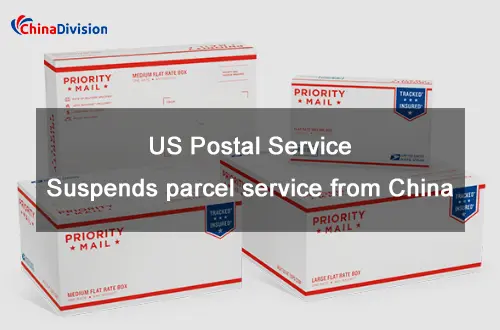US Postal Service Suspends Parcel Service From China
Table of Contents
USPS suspends the acceptance of parcels from China and Hong Kong
The USPS officially announced on Tuesday, February 4, 2025, that it would suspend the acceptance of parcels from China and Hong Kong until further notice. Letters and regular mail are not affected. This decision comes on the heels of President Trump's executive order that ended the duty-free processing of small parcels worth no more than $800.

With the rapid expansion of e-commerce, the U.S. Customs and Border Protection has been struggling to cope with the increasing number of small parcels. The United States imports nearly four million of these low-value parcels every day, most of which come from China, with little customs inspection and no tariffs. Many e-commerce companies take advantage of the duty-free provisions for low-value parcels to bring ordinary consumer goods from China into the United States without paying tariffs.
Overview of policy changes
High-value goods regulations
As of Tuesday, all goods leaving China are subject to the relevant regulations for high-value goods, that is, each parcel must provide detailed content information and pay tariffs.
Cancellation of the "De minimis" duty-free policy
Previously, packages worth no more than $800 were exempt from the need to provide detailed information or pay tariffs. However, the executive order signed by President Trump canceled this exemption and all goods from China must comply with the provisions for high-value goods.
Fentanyl channel control
The Trump administration believes that allowing these duty-free packages to enter the United States provides a channel for synthetic opioids such as fentanyl and related substances, so it decided to take this measure.
New tariff policy
From February 4, all goods leaving China will be subject to an additional tariff of 10%, and low-value packages will face a more complex tariff structure.
What impact will it have on the e-commerce and logistics industries?
Rising logistics costs
After the cancellation of the duty-free policy, low-value packages will be subject to tariffs, which will directly increase logistics costs.
Shipping delays
The suspension of the US Postal Service to accept packages may cause some orders to be delayed, affecting customer experience.
Intensified market competition
Cross-border e-commerce platforms such as Temu and Shein that rely on the duty-free policy for low-value packages may face greater challenges and need to adjust their logistics strategies.
E-commerce companies
Many e-commerce companies have taken advantage of the previous duty-free regulations to import ordinary consumer goods from China to the United States without paying tariffs. The policy adjustment will have a direct impact on the cost structure of these companies.
FedEx and UPS As logistics giants responsible for delivering a large number of packages, FedEx and UPS have also been affected by the changes in customs rules. At present, the two companies have not responded to questions about how to deal with the new rules.
Risk of supply chain congestion
Trade lawyers and industry experts said that the rapid introduction of Trump's trade order left postal and customs officials with little time to prepare to inspect so many packages. This may lead to an increased risk of supply chain congestion.
Industry response and follow-up outlook
Customs and Border Protection
The Customs and Border Protection Agency, which is responsible for inspecting imported goods and assessing tariffs, has not yet commented on the policy adjustment.
E-commerce giants affected
Research and consulting firm GlobalData Retail pointed out that the decision to ban international packages from China and Hong Kong will have the greatest impact on markets such as Shein, Temu and Amazon. These companies send millions of packages into the US system every week, and now this route is at least temporarily cut off.
Congressional discussion
Congress has been debating over the past year how to change the rules for duty-free packages to meet the challenges brought by the rapid expansion of e-commerce. In the future, we can expect to see more policy adjustments in this regard.
What are Chinadivision's countermeasures?
As a professional international logistics fulfillment and delivery service provider, we closely monitor changes in global trade policies and are committed to providing customers with the most timely and accurate delivery services. In response to this policy adjustment, we will take the following measures:
Choose diversified logistics channels
Consider using international express companies (such as DHL, FedEx, UPS) or overseas warehouse services to reduce dependence on a single logistics channel.
Optimize logistics costs
Reduce logistics costs by planning inventory in advance and choosing appropriate logistics methods (such as sea and air transportation).
Compliance declaration
Ensure that the declaration information of all goods is accurate to avoid delays caused by customs inspections.
Follow policy trends
Continue to pay attention to changes in logistics policies in the United States and around the world, and adjust logistics strategies in a timely manner.
Strengthen communication
We will maintain close communication with relevant departments, keep abreast of policy trends, and ensure that we provide customers with the most accurate information.
Optimize delivery plans
We will optimize delivery plans based on policy adjustments to ensure that goods can arrive at their destinations smoothly and efficiently.
Provide customized services
We will provide customized logistics solutions for customers' specific needs to help customers reduce costs and improve efficiency.
B2B and e-commerce sellers are requested to pay close attention to the impact of this policy adjustment and contact us in a timely manner so that we can jointly cope with challenges and seize opportunities. Thank you for your understanding and support!





